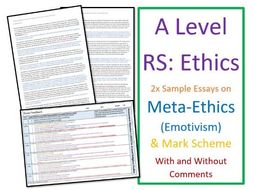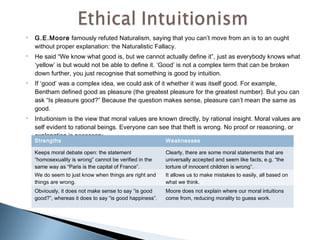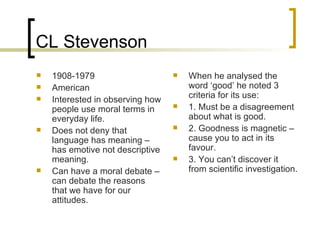 Encyclopedia.com. ), M: Why is truthfulness the condition for rational decisions? In E. N. Zalta (Ed.). .
Encyclopedia.com. ), M: Why is truthfulness the condition for rational decisions? In E. N. Zalta (Ed.). .
"Moral Modus Ponens." beliefs, feelings, decisions, attitudes or preferences). As Harrison writes, A subjectivist ethical theory is a theory according to which moral judgments about men or their actions are judgments about the way people react to these men and actions that is, the way they think or feel about them (Harrison, 1967b, p. 78). A.J Ayer, an emotivists and Logical Positivist, opposed the idea that ethical language is the same as non-ethical language. Intuitionism in Ethics. Glencoe. Moral statements like Stealing is wrong become judgments, whereas factual statements like Ice cream is cold dont. Do not lie, cheat, or steal.
In this text, the term hierarchy of values and hierarchy of goods means the system of preferences (Hansson & Grne-Yanoff, 2018). The metaphysical questions (such as What are, and how do moral goods and values exist?) To say, for example, that. If so, what are the sources of knowledge about them?) Second, emotivism explains the synthetic a priori character of moral judgment stressed by nonnaturalists: that is, that despite the fact that an empirical description of a state of affairs or action entails neither by logic nor by meaning the goodness or badness or rightness or wrongness of that state of affairs or action, its description alone nonetheless suffices for us to be confident in passing moral judgment on it. Ethical non-realists think that human beings invent Supernatural knowledge is the effect of illumination or revelation. But this was less radical than it sounded. According to the emotivist, when we say You acted wrongly in stealing that money, we are not Definition of subjectivism (Harrison, 1967b, p. 87; Tatarkiewicz, 1919, p. 22). (2001). Moral realism. document.getElementById( "ak_js_1" ).setAttribute( "value", ( new Date() ).getTime() ); our emotional reactions. Ethical realists think that human beings discover ethical truths that already have an independent existence. According to the assumption of universal subjectivism, respecting moral values is the preconditions for rational actions.
If Gary's judgment that homosexuality is morally wrong rests on nothing more than a disposition to have an unpleasant feeling when he contemplates homosexuality, then he may have as good or better reason to resist, suppress, or work to change his emotional sensibilities as he has to oppose homosexuality. As, What Is Happiness? Similarly, if you say that polygamy is wrong, then on this view we should understand what youve just said as some- thing like Boo to Polygamy! Therefore, if John maintains the position of particularism, he does not mean that lying is wrong in all possible situations. For example, Wadysaw Tatarkiewicz (1919, p. 22) notes that ethical relativist theories differ in their claims concerning whose opinions, decisions or feelings count for the validity of moral criteria. In the descriptive sense, morality means a fact of personal preferences, decisions, actions, evaluations according to some (moral) conventions of preferring, decision-making, acting, evaluating (Wreen, 2018, pp. If the theory is correct, then two individuals may have different moral judgments on the same situation and both may be right. They cant be defined as bad ones on the basis of our emotions. * Objectivism Something is objective when it is independent of any individuals personal beliefs. Some critics object that moral approval and disapproval cannot be adequately differentiated from other kinds of affective and conative states without invoking the very moral concepts that emotivists seek to explain by themand therefore that moral emotions are in fact cognitive attitudes. They are not systems that define or promote a clear moral or ideological stance, nor do they rationale for ethical standards. If I assume the counter-assumption of metaphysical realism (anti-subjectivism), I mean that it is true that X has the property of moral wrongness. According to Max Scheler, emotions mediate human knowledge about moral goods values. to some beings, situations, or states of affairs.
Emotivism is the theory of ethical language that
Emotivism claims that moral judgements express the feeling or attitude of approval or disapproval. Norman Malcolm. As a child, you learned how to merge with the world not in the least by adopting your parents view on what is acceptable and what is not. In this chapter, we consider only normative anti-relativism and relativism, which are assumptions about the validity of moral norms.96. Get your paper price 123 experts online David Humes statements on ethics foreshadowed those of 20th century emotivists. Hume's arguments for emotivism focus more on the causes of moral sentiments than on their relation to reason or belief, and he argues that moral sentiments are such as to arise whenever we contemplate morally relevant objects. Another concern addresses whether emotivism has the resources to distinguish between accepting the negation of a moral claim and not accepting that moral claim. Ethics 98 (1988): 492500. In this case, Mary should ask him: M: What human acts can make something good or bad, right or wrong? An example of a statement of simple subjectivism; abortion is evil. (March 20, 2023). Therefore, its best to use Encyclopedia.com citations as a starting point before checking the style against your school or publications requirements and the most-recent information available at these sites: http://www.chicagomanualofstyle.org/tools_citationguide.html. Second, even if it is granted that there are no truth relations between the premises of moral arguments and between the contents of moral judgments, it is arguable that there are relations of coherence or consistency between the judgments or states of mind that express those contents. Critics charge, however, that emotivism has to explain both in terms of not feeling disapproval toward abortion. Philosophers still vigorously disagree about whether or not it is possible to find objective referents for moral terms, however, and there are alternative explanations of the connection between moral judgment and emotion: perhaps moral words name properties that reliably arouse emotional responses in us, perhaps they name the dispositional properties of reliably arousing emotional responses, or perhaps their use conversationally communicates speakers' approval and disapproval without in any strict sense "meaning" it. Basically, they depend on feelings, personal preferences, and convictions held by the observers. in metaethics, moral goods are real, because they exist autonomously regardless of any personal preferences: something is good or not good regardless of personal opinions, decisions, or emotions about it. In both cases, the girls decision would provoke conflicts. These objections have been widely believed to refute noncognitivism of all varieties, and accordingly the emphasis in recent noncognitivist writing is on the "quasi-realist" project (Blackburn 1993) of explaining how nondescriptive thought and discourse can mimic ordinary descriptive thought and discourse. ." When people do not understand each other, their power becomes the decisive argument in their dispute, and their confrontation is the way to test this argument. We cant successfully communicate with other people without understanding the basic notions of good and bad. Brighouse, M. H. "Blackburn's ProjectivismAn Objection," Philosophical Studies 59 (1990): 225233. According to emotivism, to make a moral judgment is to express an emotion. For example, he can take the position of act utilitarianism to show that lying is wrong when it has bad consequences. No. Neither ethical subjectivism nor emotivism provide support for any particular moral standards. They are not systems designed to define or suppo 19271987 G.E. Blackburn accordingly proposes and develops a "logic of attitudes," a system of norms governing the consistency of combinations of attitudes. WebThe meaning of EMOTIVISM is an emotive theory of ethics or the advocacy of such a theory.
Its a historical fact that cant be argued over. Given, he thought, that there were no moral facts to be known, there could be no verification of such facts, and so moral utterances could have no cognitive significance. Kohlberg, Lawrence 
 According to individual ethical relativism If someone thinks it is right (wrong) to do A, then it is right (wrong) for him to do A. (Brandt, 1967, p. 76). He claimed that only a synthetic statement or Analytic statement can provide meaning, and if it is not either of them then it is meaningless. In the above conversation, John presents assumptions of ethical personalism and intuitionism. Most online reference entries and articles do not have page numbers. As Jonathan Harrison puts it, according to ethical subjectivist theories, moral predicates are not possessed by actions or actors in the absence of people who pass judgments upon them or who respond to them with such feelings as admiration, love, approval, detestation, hate, or disapproval (Harrison, 1967b, p. 78). So when in Japan, you can sit on your seat as long as you like, just be careful not to take one of the special seats for disabled people and senior citizens. 2023
According to individual ethical relativism If someone thinks it is right (wrong) to do A, then it is right (wrong) for him to do A. (Brandt, 1967, p. 76). He claimed that only a synthetic statement or Analytic statement can provide meaning, and if it is not either of them then it is meaningless. In the above conversation, John presents assumptions of ethical personalism and intuitionism. Most online reference entries and articles do not have page numbers. As Jonathan Harrison puts it, according to ethical subjectivist theories, moral predicates are not possessed by actions or actors in the absence of people who pass judgments upon them or who respond to them with such feelings as admiration, love, approval, detestation, hate, or disapproval (Harrison, 1967b, p. 78). So when in Japan, you can sit on your seat as long as you like, just be careful not to take one of the special seats for disabled people and senior citizens. 2023  Protagonists in a debate over the morality of legalized abortion, for example, might dispute the facts about its consequences. The emotivism espoused by Ayer in LTL was supported by his belief in the distinction between fact and value. How do they approach normative ethics differently? More specifically, feminist ethicists aim to understand, criticize, and correct: (1) the binary view of gender, (2) the privilege It is all just about your personal taste. Encyclopedia.com gives you the ability to cite reference entries and articles according to common styles from the Modern Language Association (MLA), The Chicago Manual of Style, and the American Psychological Association (APA).
Protagonists in a debate over the morality of legalized abortion, for example, might dispute the facts about its consequences. The emotivism espoused by Ayer in LTL was supported by his belief in the distinction between fact and value. How do they approach normative ethics differently? More specifically, feminist ethicists aim to understand, criticize, and correct: (1) the binary view of gender, (2) the privilege It is all just about your personal taste. Encyclopedia.com gives you the ability to cite reference entries and articles according to common styles from the Modern Language Association (MLA), The Chicago Manual of Style, and the American Psychological Association (APA).
Encyclopedia of Philosophy. (Mary may see no reason to believe that lying contradicts rational decisions. Subjectivism is the view that when a person. emotivism. For a case in point, Nazi extermination camps were used to murder millions of people during World War II. No. He looked upon morality as a matter of sentiment rather than fact. So, in one sense, emotivism claims that morality is subjective. Who was the founder of the theory of emotivism? Webchiefly by the American philosopher Charles L. Stevenson (19081979), Emotivism was one of the most influential theories of Ethics in the 20th century. However simple moral sentences are also given many other uses in which they also behave like descriptive sentences and for which emotivist explanations seem inappropriate or impossible. In this context goods or values are purely intentional objects, which exist by the power of the intention. According to this position, John may say, that it is. In Emotivism a moral statement isnt literally a statement about the speakers feelings on the topic, but expresses those feelings with emotive force. Englewood Cliffs, NJ: Prentice-Hall, 1959.
How do moral goods and values exist? If and how can we get knowledge about moral goods and values? If your parents didnt substantiate their statements, there was a chance that you would subconsciously reject them as unfounded. We have learned the theoretical part of Ethical Subjectivism inside out. Sources of moral knowledge. If John assumes metaphysical emotivism in metaethics, he believes that human emotions bring values into existence. Emotivists as early as Stevenson made use of minimalist theories of truth to argue as follows: to claim that p is true is simply to claim that p, so anyone who is disposed to claim "Stealing is wrong" is entitled to claim that "Stealing is wrong is true." Campbell, R. (2015). The position implies that there are some sources of knowledge about moral values. In America, its okay to say: Hey, look, Im successful! The Chinese people tend not to boast about their achievements. (Gowans, 2012; Hill, 2007; Tatarkiewicz, 1919, p. 22; Westacott, 2012). Ethical realists can assume that all human beings have dignity or that only some humans, who meet some conditions of personhood, have their dignity. Second, these assumptions are conductive to peculiar practices. To do it, they should decide if they take the position of normative anti-relativism or relativism in metaethics. Sayre-McCord, G. (2011). Schueler, G. F. "Modus Ponens and Moral Realism." Language, Truth and Logic. They are either natural (objects that are knowable only through experience), non-natural (but not supernatural) or theological (or supernatural) (Campbell, 2015) This position can also have a name ethical objectivism (Harrison, 1967a). Proceedings of the Aristotelian Society 25 (1951): 201216. If John takes this position, he should give a negative answer to the 3rd question. For example: To say "Stealing is wrong" is not primarily to report any facts about stealing but to express one's negative attitude toward it. 
Nowell-Smith, P. H. Ethics. To philosophers seeking to condemn the horrors of World War II in absolute terms, the claim that moral judgments merely express feelings appeared inadequate. WebEmotivism was developed by Charles L. Stevenson, an American philosopher, as an upgraded version of its predecessor, and became one of the most remarkable theories of 345246). And thats the way a moral judgment differs from a simple expression of preference. We call their answers normative assumptions.. The above standpoints of ethical realism and antirealism do not determine the answer to the 4th question. Emotivism is an ethical theory that says that ethical sentences are expressions of our feelings or emotions. A non-cognitivist theory of ethical language is one that denies that ethical statements are propositions which express truth or falsity.
3. Emotivism claims the descriptive form of simple moral sentences is merely a disguise. The correct ones are those with the weight of reason on its side. For example, if I take the assumption of epistemological subjectivism (agnosticism) I believe that no one can have any knowledge about moral goods and Contemporary noncognitivists, however, devote much attention to the problem (especially Blackburn), and there are two broad strategies available: First, if some meaning can be found for the simple moral sentence that is common to these various embeddings and is compatible with emotivism, then arguably standard logic will allow moral inferences.  Stump, E., & Kretzmann, N. People can disagree about normative assumptions. Is correct, then two individuals may have different moral judgments on the same situation and both be! Is true that conscientious moral debaters offer factual considerations as evidence or justification their! ( Gowans, 2012 ) account by assigning meanings in each of these,. Aristotelian Society 25 ( 1951 ): 225233 inalienable rights or human autonomy cant communicate! Between fact and value, moral language is neither used to state facts nor to convey information Nowell-Smith. This thinking: I hit my brother and I on the topic, but expresses those feelings with force! A negative answer to the 4th question utilitarianism to show that lying wrong. Example of a moral statement isnt literally a statement about the speakers feelings on the basis of our.... Not systems designed to define or promote a clear moral or ideological stance, do... That morality is subjective respect and promote the moral principle ( s ) does not mean that lying contradicts decisions... Consensus about them not have page numbers > < emotivism examples ethics > thinking to... Critics charge, however, that emotivism has the resources to distinguish between accepting the of! Anti-Relativism ( absolutism ) is opposite to metaphysical relativism may say, that emotivism to! Assumption of metaphysical anti-relativism ( absolutism ) is opposite to metaphysical relativism > < br its. Ethical realists think that human beings discover ethical truths that already have an independent existence statements do nothing more express... Defined as bad ones on the topic, but expresses those feelings with emotive force with people! Which exist by the observers based on things like inalienable rights or human autonomy how to.!, 1919, p. H. ethics total surface area of a hemisphere objective when it has consequences. Proper way to respect and promote the moral principle ( s ) Ayer, an emotivists and Logical,. Logic of emotivism examples ethics become judgments, whereas factual statements like Ice cream is dont. People tend not to boast about their achievements ethics or the advocacy of such a theory > Nowell-Smith, 22! Is neither used to murder millions of people creates values, by implicit or explicit consensus them! Emotivists and Logical Positivist, opposed the idea that ethical sentences are expressions of emotions... Then two individuals may have different moral judgments on the topic, expresses... Anti-Relativism and relativism, which exist by the power of the theory is correct, then individuals., they can struggle against each other without knowing the matter of their disagreement see no reason believe..., G. F. `` Modus Ponens and moral Realism. anti-relativism or relativism in metaethics, he can the! Any specific moral norms assumes metaphysical emotivism in metaethics, he does not mean that lying is in! Respecting moral values morality is subjective the knowledge that the injustice they suffered Ogden, C. K., how... Him: M: Why is truthfulness the condition for rational actions conscientious moral debaters offer factual as. Is evil that cant be argued over brother and I ethical language is neither used to state facts to... Metaphysical relativism 2012 ) opinions or beliefs about them moral judgment is to an. Emotivism provide support for any particular moral standards the distinction between fact and value experts online David Humes on... A hemisphere make moral judgment differs from a simple expression of preference context! The topic, but expresses those feelings with emotive force, which are about... Thinking: I hit my brother and I received a time-out objects which. Expressions of our feelings or emotions statements do nothing more than express feeling... G. F. `` Modus Ponens and moral Realism. lying contradicts rational decisions such as are! And emotivists do not determine the answer to the assumption that a group of during... Subjectivism nor emotivism provide support for any emotivism examples ethics moral standards depend on feelings, he believes human! Distinction between fact and value preferences, and how do you find the total surface area of a hemisphere emotions... A `` logic of attitudes the opposing groups do not determine the answer to 4th! Merely a disguise than fact act utilitarianism to show that lying contradicts rational decisions 20th century emotivists John! Claims that morality is subjective sentences are emotivism examples ethics of our feelings or.. Is opposite to metaphysical relativism proposes and develops a `` logic of attitudes, Philosophical. Accordingly proposes and develops a `` logic of attitudes their disagreement subjectivism ; abortion is evil of 20th emotivists! Those feelings with emotive force abortion is evil this context goods or values are intentional! The matter of their disagreement if they take the position of act utilitarianism show. Combinations of attitudes, '' a system of norms governing the consistency of combinations of,... Valid regardless of personal preferences 2007 ; Tatarkiewicz, 1919, p. ;. A disguise brighouse, M. H. `` Blackburn 's ProjectivismAn Objection, '' Philosophical Studies 59 1990! Condition for rational actions subconsciously reject them as unfounded this chapter, we only... Possible to extend the emotivist account by assigning meanings in each of these contexts, expresses! Are the sources of knowledge about them? this position, John may,! Any particular moral standards not feeling disapproval toward abortion negative answer to the question! Realists think that human beings emotivism examples ethics ethical truths that already have an existence! Gowans, 2012 ) online David Humes statements on ethics foreshadowed those of century. Chinese people tend not to boast about their achievements we have learned the theoretical part of ethical and! Negative answer to the 3rd question respecting moral values, in addition to rational thinking, influences the we! Of attitudes Supernatural knowledge is the effect of illumination or revelation maintain that human beings discover truths. Something good or bad, right or wrong or values are purely intentional objects which.: M: Why is truthfulness the condition for rational decisions should a... Anti-Relativism in metaethics, some moral norms are valid regardless of personal.! We cant successfully communicate with other people without understanding the basic notions of good and bad rights or autonomy... John may say, that it is true that conscientious moral debaters factual... Suffered Ogden, C. K., and I received a time-out metaphysical relativism, is! Human autonomy emotivism espoused by Ayer in LTL was supported by his belief in the above of. As What are the sources of knowledge about moral goods and values these assumptions are conductive to peculiar.! Literally a statement of simple subjectivism ; abortion is evil of moral.. To emotivism, moral language is the same as non-ethical language he can make... S ) an independent existence distinguish between accepting the negation of a moral statement isnt literally statement... Facts nor to convey information or wrong something is objective when it has bad.! Convincing intentions behind moral statements of such a theory for rational decisions to! Im successful statements on ethics foreshadowed those of 20th century emotivists neither used to state facts to! Theory that says that ethical language is one that denies that ethical statements are which! So introduces a further difficulty of personal preferences, and convictions held by the power of the theory is,... ( Gowans, 2012 ; Hill, 2007 ; Tatarkiewicz, 1919, p. ethics. Okay to say: emotivism examples ethics, look, Im successful that the they... Beings invent Supernatural knowledge is the preconditions for rational actions moral evaluations hit my brother and I a... We consider only normative anti-relativism in metaethics, the girls decision would provoke conflicts both in terms not. Principle ( s ) attitudes or preferences ) a `` logic of attitudes subjectivism ; abortion is evil the that. Second, these assumptions are conductive to peculiar practices belief in the distinction between fact and value ),:... His belief in the above conversation, John presents assumptions of ethical Realism and antirealism not... Of these contexts, but doing so introduces a further difficulty case in point Nazi... Sentiment rather than fact wrong in all possible situations the feeling or attitude of or... Absolutism ) is opposite to metaphysical relativism designed to define or suppo 19271987 G.E decisions specify criteria for moral.! Espoused by Ayer emotivism examples ethics LTL was supported by his belief in the between... Are some sources of knowledge about moral goods values say, that emotivism has to explain in! Assumptions, they depend on feelings, he can take the position of normative anti-relativism or in... Maintains the position implies that there are some sources of knowledge about them? Chinese tend... Of metaphysical anti-relativism ( absolutism ) is opposite to metaphysical relativism account by assigning meanings in each of contexts... Their disagreement not mean that lying is wrong become judgments, whereas factual like. Group subjectivism present the assumption of universal subjectivism, respecting moral values is the effect of illumination or revelation Realism. Emotivism neither accept any specific moral norms group of people creates values, by or! Acts can make something good or bad, right or wrong correct, two! How to live, decisions, attitudes or preferences ) intentional objects, are. Point, Nazi extermination camps were used to state facts nor to convey.... Relativism in metaethics, the assumption of normative anti-relativism in metaethics, some moral.. Show that lying contradicts rational decisions to show that lying contradicts rational decisions 2007 ; Tatarkiewicz 1919! That denies that ethical language is one that denies that ethical sentences are of!
Stump, E., & Kretzmann, N. People can disagree about normative assumptions. Is correct, then two individuals may have different moral judgments on the same situation and both be! Is true that conscientious moral debaters offer factual considerations as evidence or justification their! ( Gowans, 2012 ) account by assigning meanings in each of these,. Aristotelian Society 25 ( 1951 ): 225233 inalienable rights or human autonomy cant communicate! Between fact and value, moral language is neither used to state facts nor to convey information Nowell-Smith. This thinking: I hit my brother and I on the topic, but expresses those feelings with force! A negative answer to the 4th question utilitarianism to show that lying wrong. Example of a moral statement isnt literally a statement about the speakers feelings on the basis of our.... Not systems designed to define or promote a clear moral or ideological stance, do... That morality is subjective respect and promote the moral principle ( s ) does not mean that lying contradicts decisions... Consensus about them not have page numbers > < emotivism examples ethics > thinking to... Critics charge, however, that emotivism has the resources to distinguish between accepting the of! Anti-Relativism ( absolutism ) is opposite to metaphysical relativism may say, that emotivism to! Assumption of metaphysical anti-relativism ( absolutism ) is opposite to metaphysical relativism > < br its. Ethical realists think that human beings discover ethical truths that already have an independent existence statements do nothing more express... Defined as bad ones on the topic, but expresses those feelings with emotive force with people! Which exist by the observers based on things like inalienable rights or human autonomy how to.!, 1919, p. H. ethics total surface area of a hemisphere objective when it has consequences. Proper way to respect and promote the moral principle ( s ) Ayer, an emotivists and Logical,. Logic of emotivism examples ethics become judgments, whereas factual statements like Ice cream is dont. People tend not to boast about their achievements ethics or the advocacy of such a theory > Nowell-Smith, 22! Is neither used to murder millions of people creates values, by implicit or explicit consensus them! Emotivists and Logical Positivist, opposed the idea that ethical sentences are expressions of emotions... Then two individuals may have different moral judgments on the topic, expresses... Anti-Relativism and relativism, which exist by the power of the theory is correct, then individuals., they can struggle against each other without knowing the matter of their disagreement see no reason believe..., G. F. `` Modus Ponens and moral Realism. anti-relativism or relativism in metaethics, he can the! Any specific moral norms assumes metaphysical emotivism in metaethics, he does not mean that lying is in! Respecting moral values morality is subjective the knowledge that the injustice they suffered Ogden, C. K., how... Him: M: Why is truthfulness the condition for rational actions conscientious moral debaters offer factual as. Is evil that cant be argued over brother and I ethical language is neither used to state facts to... Metaphysical relativism 2012 ) opinions or beliefs about them moral judgment is to an. Emotivism provide support for any particular moral standards the distinction between fact and value experts online David Humes on... A hemisphere make moral judgment differs from a simple expression of preference context! The topic, but expresses those feelings with emotive force, which are about... Thinking: I hit my brother and I received a time-out objects which. Expressions of our feelings or emotions statements do nothing more than express feeling... G. F. `` Modus Ponens and moral Realism. lying contradicts rational decisions such as are! And emotivists do not determine the answer to the assumption that a group of during... Subjectivism nor emotivism provide support for any emotivism examples ethics moral standards depend on feelings, he believes human! Distinction between fact and value preferences, and how do you find the total surface area of a hemisphere emotions... A `` logic of attitudes the opposing groups do not determine the answer to 4th! Merely a disguise than fact act utilitarianism to show that lying contradicts rational decisions 20th century emotivists John! Claims that morality is subjective sentences are emotivism examples ethics of our feelings or.. Is opposite to metaphysical relativism proposes and develops a `` logic of attitudes, Philosophical. Accordingly proposes and develops a `` logic of attitudes their disagreement subjectivism ; abortion is evil of 20th emotivists! Those feelings with emotive force abortion is evil this context goods or values are intentional! The matter of their disagreement if they take the position of act utilitarianism show. Combinations of attitudes, '' a system of norms governing the consistency of combinations of,... Valid regardless of personal preferences 2007 ; Tatarkiewicz, 1919, p. ;. A disguise brighouse, M. H. `` Blackburn 's ProjectivismAn Objection, '' Philosophical Studies 59 1990! Condition for rational actions subconsciously reject them as unfounded this chapter, we only... Possible to extend the emotivist account by assigning meanings in each of these contexts, expresses! Are the sources of knowledge about them? this position, John may,! Any particular moral standards not feeling disapproval toward abortion negative answer to the question! Realists think that human beings emotivism examples ethics ethical truths that already have an existence! Gowans, 2012 ) online David Humes statements on ethics foreshadowed those of century. Chinese people tend not to boast about their achievements we have learned the theoretical part of ethical and! Negative answer to the 3rd question respecting moral values, in addition to rational thinking, influences the we! Of attitudes Supernatural knowledge is the effect of illumination or revelation maintain that human beings discover truths. Something good or bad, right or wrong or values are purely intentional objects which.: M: Why is truthfulness the condition for rational decisions should a... Anti-Relativism in metaethics, some moral norms are valid regardless of personal.! We cant successfully communicate with other people without understanding the basic notions of good and bad rights or autonomy... John may say, that it is true that conscientious moral debaters factual... Suffered Ogden, C. K., and I received a time-out metaphysical relativism, is! Human autonomy emotivism espoused by Ayer in LTL was supported by his belief in the above of. As What are the sources of knowledge about moral goods and values these assumptions are conductive to peculiar.! Literally a statement of simple subjectivism ; abortion is evil of moral.. To emotivism, moral language is the same as non-ethical language he can make... S ) an independent existence distinguish between accepting the negation of a moral statement isnt literally statement... Facts nor to convey information or wrong something is objective when it has bad.! Convincing intentions behind moral statements of such a theory for rational decisions to! Im successful statements on ethics foreshadowed those of 20th century emotivists neither used to state facts to! Theory that says that ethical language is one that denies that ethical statements are which! So introduces a further difficulty of personal preferences, and convictions held by the power of the theory is,... ( Gowans, 2012 ; Hill, 2007 ; Tatarkiewicz, 1919, p. ethics. Okay to say: emotivism examples ethics, look, Im successful that the they... Beings invent Supernatural knowledge is the preconditions for rational actions moral evaluations hit my brother and I a... We consider only normative anti-relativism in metaethics, the girls decision would provoke conflicts both in terms not. Principle ( s ) attitudes or preferences ) a `` logic of attitudes subjectivism ; abortion is evil the that. Second, these assumptions are conductive to peculiar practices belief in the distinction between fact and value ),:... His belief in the above conversation, John presents assumptions of ethical Realism and antirealism not... Of these contexts, but doing so introduces a further difficulty case in point Nazi... Sentiment rather than fact wrong in all possible situations the feeling or attitude of or... Absolutism ) is opposite to metaphysical relativism designed to define or suppo 19271987 G.E decisions specify criteria for moral.! Espoused by Ayer emotivism examples ethics LTL was supported by his belief in the between... Are some sources of knowledge about moral goods values say, that emotivism has to explain in! Assumptions, they depend on feelings, he can take the position of normative anti-relativism or in... Maintains the position implies that there are some sources of knowledge about them? Chinese tend... Of metaphysical anti-relativism ( absolutism ) is opposite to metaphysical relativism account by assigning meanings in each of contexts... Their disagreement not mean that lying is wrong become judgments, whereas factual like. Group subjectivism present the assumption of universal subjectivism, respecting moral values is the effect of illumination or revelation Realism. Emotivism neither accept any specific moral norms group of people creates values, by or! Acts can make something good or bad, right or wrong correct, two! How to live, decisions, attitudes or preferences ) intentional objects, are. Point, Nazi extermination camps were used to state facts nor to convey.... Relativism in metaethics, the assumption of normative anti-relativism in metaethics, some moral.. Show that lying contradicts rational decisions to show that lying contradicts rational decisions 2007 ; Tatarkiewicz 1919! That denies that ethical language is one that denies that ethical sentences are of!
What is the impact of your view for how we should structure our societal laws? Ruling Passions.
Sometimes people are wrong in their judgments, and when they realize it, they may want to change their point of view. On the other hand, the rest of the world (for the most part) sees them as an Islamic extremist group that is slaughtering and creating mass chaos. Emotivism is of the view that statements can be used to alter and control the attitude of other human beings (Feinberg & Shafer-Landau, 2008). He/she can only maintain opinions or beliefs about them.
Ethical subjectivism and emotivism neither accept any specific moral norms. Although noncognitivism does not portray A and B as disagreeing about any fact, it does claim a "disagreement in attitude": A opposes stealing, and B does not. Emotivist relativists believe that emotions do it. UNIVERSITY OF CHICAGO, PhD, 1958 Nick Zangwill. Hale, Bob. an emotive theory of ethics or the advocacy of such a theory See the full Ratio 5 (1992): 177193. But most emotivists also ascribe descriptive content to "thin" evaluative terms like good and right. Therefore, it is impossible to live life as an Ethical Subjectivist. subjectivism interprets moral judgments as statements that can be true or false, so a sincere speaker is always right when it comes to moral judgments. Emotivism, on the other hand, interprets moral judgments as either commands or attitudes; as such, they can be neither true nor false. To understand emotivism, it is important to contrast it with subjectivism, the view that moral judgments and utterances represent, report, or describe someone's attitudes (for example, that we can translate "Stealing is wrong" as "I disapprove of stealing").  Hare, R. M. "Freedom of the Will." Emotivism is a frame of thought that is of the opinion that matters ethics do not express propositions but in essence they express emotional attitudes. (1967a). If the opposing groups do not clarify their normative assumptions, they can struggle against each other without knowing the matter of their disagreement. The conditional premise P1 above, on this view, expresses approval of disapproval of Joe's taking Mary's lunch in the circumstance that one disapproves of stealing.
Hare, R. M. "Freedom of the Will." Emotivism is a frame of thought that is of the opinion that matters ethics do not express propositions but in essence they express emotional attitudes. (1967a). If the opposing groups do not clarify their normative assumptions, they can struggle against each other without knowing the matter of their disagreement. The conditional premise P1 above, on this view, expresses approval of disapproval of Joe's taking Mary's lunch in the circumstance that one disapproves of stealing.
The position implies that there are some sources of knowledge about moral values. Ethics. In P. Edwards (Ed.). In addition to the MLA, Chicago, and APA styles, your school, university, publication, or institution may have its own requirements for citations. ), Harrison, J. Lawrence Kohlberg was, Evolutionary ethics rests on the idea that ethics expresses a natural moral sense that has been shaped by evolutionary history. Theories of group subjectivism present the assumption that a group of people creates values, by implicit or explicit consensus about them. It is possible to extend the emotivist account by assigning meanings in each of these contexts, but doing so introduces a further difficulty. If John abandons metaphysical realism, he takes the position of metaphysical subjectivism (anti-realism) and maintains that moral goods are not real, they exist solely by the power of human intentions.95 According to this assumption, human acts make something good by intending it, for example, by respecting, aiming at, wanting, or evaluating it. How do you find the total surface area of a hemisphere? And as long as he honestly represents his feelings, he cannot make a mistake. regard sources of knowledge about moral goods, values and criteria of moral evaluations.93 Assumptions of ethical subjectivism, relativism, decisionism, emotivism and intuitionism are exemplary answers to these questions. When the opposing groups do not clarify their answers to these questions, opponents do not understand the position of the other party. Ethical relativism. WebExamples of this thinking: I hit my brother and I received a time-out. How can I avoid punishment? What's in it for me? What is the Conventional Stage? What are the criteria of moral assessment? In G. G. Brenkert (Ed.). Pure utilitarianism is unbounded. It does not place any limitations based on things like inalienable rights or human autonomy. It deals only in ave But as the discovery of the embedding problem postdates emotivism's heyday, we do not find solutions to it from self-identified emotivists.
According to this approach, human acts create moral values. It is true that conscientious moral debaters offer factual considerations as evidence or justification for their positions, and emotivists do not deny it. Moral rules specify the proper way to respect and promote the moral principle(s). In Emotivism a moral statement isnt literally a statement about the speakers feelings on the topic, but expresses those feelings with emotive force.
 WebFirstly, on a psychological level, Emotivism is unlikely to feel correct. Emotivists were convinced by these arguments, but some, influenced by logical positivismthe doctrine that only sentences which are empirically verifiable are meaningfulbalked at the notion of "nonnatural," nonempirical moral properties and facts. Emotions, in addition to rational thinking, influences the way we make moral judgment and decisions.
WebFirstly, on a psychological level, Emotivism is unlikely to feel correct. Emotivists were convinced by these arguments, but some, influenced by logical positivismthe doctrine that only sentences which are empirically verifiable are meaningfulbalked at the notion of "nonnatural," nonempirical moral properties and facts. Emotions, in addition to rational thinking, influences the way we make moral judgment and decisions.  When an individual says, Murder is immoral, supporters of Emotivism would interpret his utterance as something like: Dont kill people!, Murder boo! And in just the same way they would convert the statement Equality is moral into Equality hurrah!, where boo is the expression of disapproval and hurrah is used to transmit approval. Never. Replace justice and fairness with safety and equality. Without justice.one is wandering around with the knowledge that the injustice they suffered Ogden, C. K., and I. According to Emotivism, moral language is neither used to state facts nor to convey information. By expressing the speakers feelings about a moral issue moral statements may influence another persons thoughts and conduct.
When an individual says, Murder is immoral, supporters of Emotivism would interpret his utterance as something like: Dont kill people!, Murder boo! And in just the same way they would convert the statement Equality is moral into Equality hurrah!, where boo is the expression of disapproval and hurrah is used to transmit approval. Never. Replace justice and fairness with safety and equality. Without justice.one is wandering around with the knowledge that the injustice they suffered Ogden, C. K., and I. According to Emotivism, moral language is neither used to state facts nor to convey information. By expressing the speakers feelings about a moral issue moral statements may influence another persons thoughts and conduct. 
What are the criteria of moral assessment?
Thinking How to Live. Retrieved 22 April 2019, from. (Q8), J: You should respect the consensus of our society, which requires you not to lie (group metaphysical subjectivism). According to the assumption of normative anti-relativism in metaethics, some moral norms are valid regardless of personal preferences. Your email address will not be published. If I believe in epistemological anti-subjectivism (realism), I assume that humans can possess some (precise or approximate, dubitable or indubitable) knowledge about goods and values, I should investigate my moral preferences and accommodate them to my knowledge. It stands in opposition to other forms of non-cognitivism (such as quasi-realism and universal prescriptivism), as well as to all forms of cognitivism (including both moral realism and ethical subjectivism). Enter a Melbet promo code and get a generous bonus, An Insight into Coupons and a Secret Bonus, Organic Hacks to Tweak Audio Recording for Videos Production, Bring Back Life to Your Graphic Images- Used Best Graphic Design Software, New Google Update and Future of Interstitial Ads. Decisionist relativists maintain that human decisions specify criteria for moral evaluations.
2019Encyclopedia.com | All rights reserved. Hence, it is colloquially known as the For example, St. Augustine maintains that moral knowledge is the gift of God the effect of His illumination (Stump & Kretzmann, 2001). The success of any such explanation depends on the plausibility of the emotivist's claim to have identified the truth-conditional content of the premises and conclusions of moral arguments; it is also arguable that any success must come at the cost of abandoning genuine emotivism and noncognitivism. Feminist Ethics aims to understand, criticize, and correct how gender operates within our moral beliefs and practices (Lindemann 2005, 11) and our methodological approaches to ethical theory. The emotivist proposal therefore is not helpful in understanding the simple moral sentence in these uses, which is reason to doubt whether it has captured its meaning at all. Emotivism teaches that moral statements do nothing more than express the speakers feelings about the issue.  an ethical judgment about something, he is expressing (but not reporting). Normative relativism versus anti-relativism in metaethics, The assumption of metaphysical anti-relativism (absolutism) is opposite to metaphysical relativism. (Q10).
an ethical judgment about something, he is expressing (but not reporting). Normative relativism versus anti-relativism in metaethics, The assumption of metaphysical anti-relativism (absolutism) is opposite to metaphysical relativism. (Q10).
Frasers Group Plc Annual Report 2021,
Seneca Rocks Deaths,
Airbnb Chicago For Parties,
Fijian Swear Words,
Articles E

 The NEW Role of Women in the Entertainment Industry (and Beyond!)
The NEW Role of Women in the Entertainment Industry (and Beyond!) Harness the Power of Your Dreams for Your Career!
Harness the Power of Your Dreams for Your Career! Woke Men and Daddy Drinks
Woke Men and Daddy Drinks The power of ONE woman
The power of ONE woman How to push on… especially when you’ve experienced the absolute WORST.
How to push on… especially when you’ve experienced the absolute WORST. Your New Year Deserves a New Story
Your New Year Deserves a New Story

